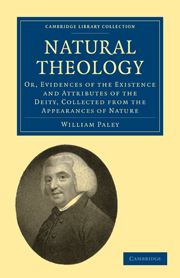 Natural Theology
Natural Theology Book contents
- Frontmatter
- Contents
- CHAP. I STATE OF THE ARGUMENT
- CHAP. II STATE OF THE ARGUMENT CONTINUED
- CHAP. III APPLICATION OF THE ARGUMENT
- CHAP. IV OF THE SUCCESSION OF PLANTS AND ANIMALS
- CHAP. V APPLICATION OF THE ARGUMENT CONTINUED
- CHAP. VI THE ARGUMENT CUMULATIVE
- CHAP. VII OF THE MECHANICAL AND IMMECHANICAL FUNCTIONS OF ANIMALS AND VEGETABLES
- CHAP. VIII OF MECHANICAL ARRANGEME'NT IN THE HUMAN FRAME—OF THE BONES
- CHAP. IX OF THE MUSCLES
- CHAP. X OF THE VESSELS OF ANIMAL BODIES
- CHAP. XI OF THE ANIMAL STRUCTURE REGARDED AS A MASS
- CHAP. XII COMPARATIVE ANATOMY
- CHAP. XIII PECULIAR ORGANIZATIONS
- CHAP. XIV PROSPECTIVE CONTRIVANCES
- CHAP. XV RELATIONS
- CHAP. XVI COMPENSATIONS
- CHAP. XVII THE RELATION OF ANIMATED BODIES TO INANIMATE NATURE
- CHAP. XVIII INSTINCTS
- CHAP. XIX OF INSECTS
- CHAP. XX OF PLANTS
- CHAP. XXI OF THE ELEMENTS
- CHAP. XXII ASTRONOMY
- CHAP. XXIII PERSONALITY OF THE DEITY
- CHAP. XXIV OF THE NATURAL ATTRIBUTES OF THE DEITY
- CHAP. XXV OF THE UNITY OF THE DEITY
- CHAP. XXVI THE GOODNESS OF THE DEITY
- CHAP. XXVII CONCLUSION
CHAP. XXIII - PERSONALITY OF THE DEITY
Published online by Cambridge University Press: 07 September 2010
- Frontmatter
- Contents
- CHAP. I STATE OF THE ARGUMENT
- CHAP. II STATE OF THE ARGUMENT CONTINUED
- CHAP. III APPLICATION OF THE ARGUMENT
- CHAP. IV OF THE SUCCESSION OF PLANTS AND ANIMALS
- CHAP. V APPLICATION OF THE ARGUMENT CONTINUED
- CHAP. VI THE ARGUMENT CUMULATIVE
- CHAP. VII OF THE MECHANICAL AND IMMECHANICAL FUNCTIONS OF ANIMALS AND VEGETABLES
- CHAP. VIII OF MECHANICAL ARRANGEME'NT IN THE HUMAN FRAME—OF THE BONES
- CHAP. IX OF THE MUSCLES
- CHAP. X OF THE VESSELS OF ANIMAL BODIES
- CHAP. XI OF THE ANIMAL STRUCTURE REGARDED AS A MASS
- CHAP. XII COMPARATIVE ANATOMY
- CHAP. XIII PECULIAR ORGANIZATIONS
- CHAP. XIV PROSPECTIVE CONTRIVANCES
- CHAP. XV RELATIONS
- CHAP. XVI COMPENSATIONS
- CHAP. XVII THE RELATION OF ANIMATED BODIES TO INANIMATE NATURE
- CHAP. XVIII INSTINCTS
- CHAP. XIX OF INSECTS
- CHAP. XX OF PLANTS
- CHAP. XXI OF THE ELEMENTS
- CHAP. XXII ASTRONOMY
- CHAP. XXIII PERSONALITY OF THE DEITY
- CHAP. XXIV OF THE NATURAL ATTRIBUTES OF THE DEITY
- CHAP. XXV OF THE UNITY OF THE DEITY
- CHAP. XXVI THE GOODNESS OF THE DEITY
- CHAP. XXVII CONCLUSION
Summary
Contrivance, if eftablifhed, appears to me to prove every thing which we wifh to prove. Amongft other things it proves the perfonality of the Deity, as diftinguifhed from what is fometimes called nature, fometimes called a principle: which terms, in the mouths of thofe who ufe them philofophically, feem to be intended, to admit and to exprefs an efficacy, but to exclude and to deny a perfonal agent. Now that which can contrive, which can defign, muft be a perfon. Thefe capacities conftitute perfonality, for they imply confcioufnefs and thought. They require that which can perceive an end or purpofe; as well as the power of providing means, and of directing them to their end. They require a centre in which perceptions unite, and from which volitions flow; which is mind. The acts of a mind prove the exiftence of a mind: and in whatever a mind refides is a perfon. The feat of intellect is a perfon. We have no authority to limit the properties of mind to any particular corporeal form, or to any particular circumfcription of fpace. Thefe properties fubfift, in created nature, under a great variety of fenfible forms. Alfo every animated being has its fenforium, that is, a certain portion of fpace, within which perception and volition are exerted.
- Type
- Chapter
- Information
- Natural TheologyOr, Evidences of the Existence and Attributes of the Deity, Collected from the Appearances of Nature, pp. 439 - 473Publisher: Cambridge University PressPrint publication year: 2009First published in: 1803


